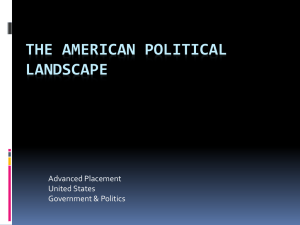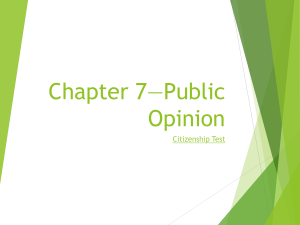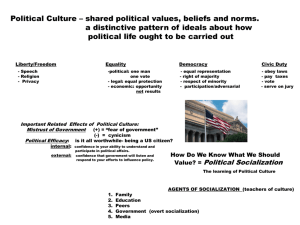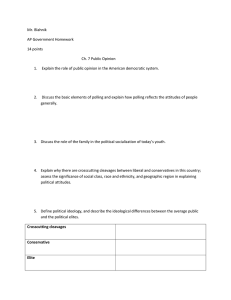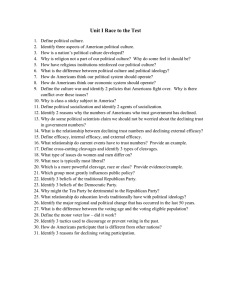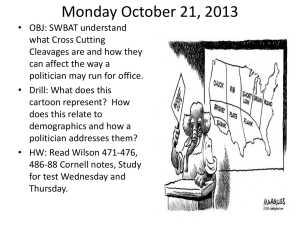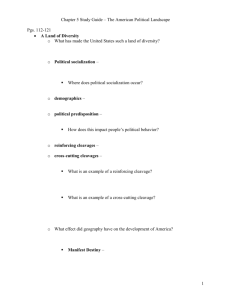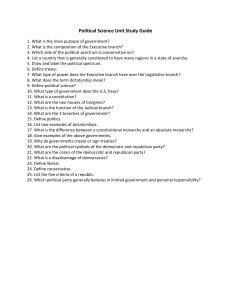Name: Rachael Sawicki: 6th Hour AP Gov. Topic: American Political
advertisement
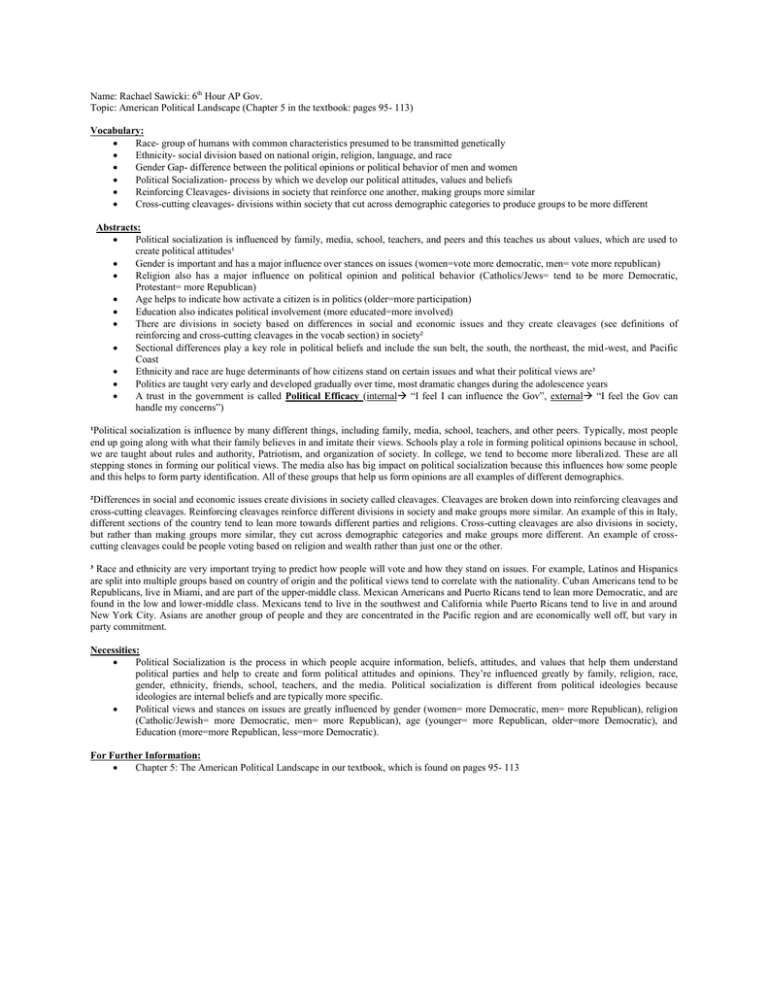
Name: Rachael Sawicki: 6th Hour AP Gov. Topic: American Political Landscape (Chapter 5 in the textbook: pages 95- 113) Vocabulary: Race- group of humans with common characteristics presumed to be transmitted genetically Ethnicity- social division based on national origin, religion, language, and race Gender Gap- difference between the political opinions or political behavior of men and women Political Socialization- process by which we develop our political attitudes, values and beliefs Reinforcing Cleavages- divisions in society that reinforce one another, making groups more similar Cross-cutting cleavages- divisions within society that cut across demographic categories to produce groups to be more different Abstracts: Political socialization is influenced by family, media, school, teachers, and peers and this teaches us about values, which are used to create political attitudes¹ Gender is important and has a major influence over stances on issues (women=vote more democratic, men= vote more republican) Religion also has a major influence on political opinion and political behavior (Catholics/Jews= tend to be more Democratic, Protestant= more Republican) Age helps to indicate how activate a citizen is in politics (older=more participation) Education also indicates political involvement (more educated=more involved) There are divisions in society based on differences in social and economic issues and they create cleavages (see definitions of reinforcing and cross-cutting cleavages in the vocab section) in society² Sectional differences play a key role in political beliefs and include the sun belt, the south, the northeast, the mid-west, and Pacific Coast Ethnicity and race are huge determinants of how citizens stand on certain issues and what their political views are³ Politics are taught very early and developed gradually over time, most dramatic changes during the adolescence years A trust in the government is called Political Efficacy (internal “I feel I can influence the Gov”, external “I feel the Gov can handle my concerns”) ¹Political socialization is influence by many different things, including family, media, school, teachers, and other peers. Typically, most people end up going along with what their family believes in and imitate their views. Schools play a role in forming political opinions because in school, we are taught about rules and authority, Patriotism, and organization of society. In college, we tend to become more liberalized. These are all stepping stones in forming our political views. The media also has big impact on political socialization because this influences how some people and this helps to form party identification. All of these groups that help us form opinions are all examples of different demographics. ²Differences in social and economic issues create divisions in society called cleavages. Cleavages are broken down into reinforcing cleavages and cross-cutting cleavages. Reinforcing cleavages reinforce different divisions in society and make groups more similar. An example of this in Italy, different sections of the country tend to lean more towards different parties and religions. Cross-cutting cleavages are also divisions in society, but rather than making groups more similar, they cut across demographic categories and make groups more different. An example of crosscutting cleavages could be people voting based on religion and wealth rather than just one or the other. ³ Race and ethnicity are very important trying to predict how people will vote and how they stand on issues. For example, Latinos and Hispanics are split into multiple groups based on country of origin and the political views tend to correlate with the nationality. Cuban Americans tend to be Republicans, live in Miami, and are part of the upper-middle class. Mexican Americans and Puerto Ricans tend to lean more Democratic, and are found in the low and lower-middle class. Mexicans tend to live in the southwest and California while Puerto Ricans tend to live in and around New York City. Asians are another group of people and they are concentrated in the Pacific region and are economically well off, but vary in party commitment. Necessities: Political Socialization is the process in which people acquire information, beliefs, attitudes, and values that help them understand political parties and help to create and form political attitudes and opinions. They’re influenced greatly by family, religion, race, gender, ethnicity, friends, school, teachers, and the media. Political socialization is different from political ideologies because ideologies are internal beliefs and are typically more specific. Political views and stances on issues are greatly influenced by gender (women= more Democratic, men= more Republican), religion (Catholic/Jewish= more Democratic, men= more Republican), age (younger= more Republican, older=more Democratic), and Education (more=more Republican, less=more Democratic). For Further Information: Chapter 5: The American Political Landscape in our textbook, which is found on pages 95- 113
